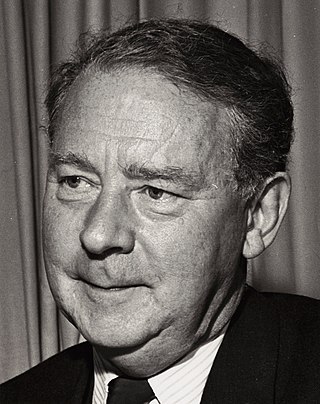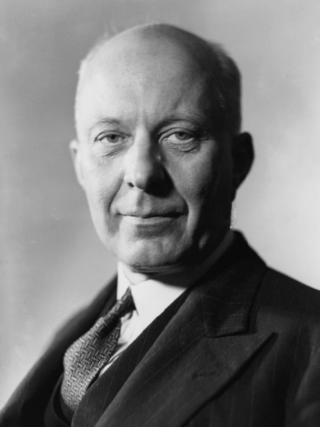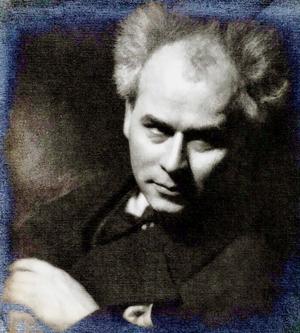Related Research Articles

James Harold Wilson, Baron Wilson of Rievaulx, was a British statesman and Labour Party politician who was Prime Minister of the United Kingdom twice, from 1964 to 1970 and again from 1974 to 1976. He was Leader of the Labour Party from 1963 to 1976, Leader of the Opposition twice from 1963 to 1964 and again from 1970 to 1974, and a Member of Parliament (MP) from 1945 to 1983. Wilson is the only Labour leader to have formed administrations following four general elections.

Hugh Todd Naylor Gaitskell was a British politician who was Leader of the Labour Party and Leader of the Opposition from 1955 until his death in 1963. An economics lecturer and wartime civil servant, he was elected to Parliament in 1945 and held office in Clement Attlee's governments, notably as Minister of Fuel and Power following the bitter winter of 1946–47, and eventually joining the Cabinet as Chancellor of the Exchequer. Facing the need to increase military spending in 1951, he imposed National Health Service charges on dentures and spectacles, prompting the leading left-winger Aneurin Bevan to resign from the Cabinet.

Emanuel Shinwell, Baron Shinwell, was a British politician who served as a government minister under Ramsay MacDonald and Clement Attlee. A member of the Labour Party, he served as a Member of Parliament (MP) for 40 years, representing Linlithgowshire, Seaham and Easington.

The 1950 United Kingdom general election was the first to be held after a full term of a majority Labour government. The general election was held on Thursday 23 February 1950, and was also the first to be held following the abolition of plural voting and university constituencies. The government's lead over the Conservative Party shrank dramatically, and Labour was returned to power but with an overall majority significantly reduced from 146 to just 5. There was a 2.8% national swing towards the Conservatives, who gained 90 seats. Labour called another general election the following year, which the Conservative Party won, returning Churchill to government after six years in opposition.

The 1959 United Kingdom general election was held on Thursday, 8 October 1959. It marked a third consecutive victory for the ruling Conservative Party, now led by Prime Minister Harold Macmillan. For the second time in a row, the Conservatives increased their overall majority in Parliament, this time to a landslide majority of 100 seats, having gained 20 seats for a return of 365. The Labour Party, led by Hugh Gaitskell, lost 19 seats and returned 258. The Liberal Party, led by Jo Grimond, again returned only six MPs to the House of Commons, but managed to increase its overall share of the vote to 5.9%, compared to just 2.7% four years earlier.
Clause IV is part of the Labour Party Rule Book which sets out the aims and values of the British Labour Party. The original clause, adopted in 1918, called for common ownership of industry, and proved controversial in later years; Hugh Gaitskell attempted to remove the clause following Labour's loss in the 1959 general election.

Edward Hugh John Neale Dalton, Baron Dalton, was a British Labour Party economist and politician who served as Chancellor of the Exchequer from 1945 to 1947. He shaped Labour Party foreign policy in the 1930s, opposing pacifism; promoting rearmament against the German threat; and strongly opposed the appeasement policy of Prime Minister Neville Chamberlain in 1938. Dalton served in Winston Churchill's wartime coalition cabinet; after the Dunkirk evacuation he was Minister of Economic Warfare, and established Special Operations Executive. As Chancellor, he pushed his policy of cheap money too hard, and mishandled the sterling crisis of 1947. His political position was already in jeopardy in 1947 when he, seemingly inadvertently, revealed a sentence of the budget to a reporter minutes before delivering his budget speech. Prime Minister Clement Attlee accepted his resignation; Dalton later returned to the cabinet in relatively minor positions.
In macroeconomics and modern monetary policy, a devaluation is an official lowering of the value of a country's currency within a fixed exchange-rate system, in which a monetary authority formally sets a lower exchange rate of the national currency in relation to a foreign reference currency or currency basket. The opposite of devaluation, a change in the exchange rate making the domestic currency more expensive, is called a revaluation. A monetary authority maintains a fixed value of its currency by being ready to buy or sell foreign currency with the domestic currency at a stated rate; a devaluation is an indication that the monetary authority will buy and sell foreign currency at a lower rate.
The post-war consensus, sometimes called the post-war compromise, was the economic order and social model of which the major political parties in post-war Britain shared a consensus supporting view, from the end of World War II in 1945 to the late-1970s. It ended during the governance of Conservative Party leader Margaret Thatcher. The consensus tolerated or encouraged nationalisation, strong trade unions, heavy regulation, high taxes, and an extensive welfare state.
The Socialist League was an organisation inside the British Labour Party, which sought to push it to the left. It was formed in 1932, through a merger between the National ILP Affiliation Committee (NILP) and the Society for Socialist Inquiry and Propaganda (SSIP), and ceased to exist in 1937.
The 1960 Labour Party leadership election was held when, for the first time since 1955, the incumbent leader Hugh Gaitskell was challenged for re-election. Normally the annual re-election of the leader had been a formality. Gaitskell had lost the 1959 general election and had seen the Labour Party conference adopt a policy of unilateral nuclear disarmament which he considered disastrous and refused to support. A vacancy in the deputy leadership was first made by the death of incumbent Aneurin Bevan.

Evan Frank Mottram Durbin was a British economist and Labour Party politician, whose writings combined a belief in central economic planning with a conviction that the price mechanism of markets was indispensable.
The Labour Party is a social democratic political party in the United Kingdom that sits on the centre-left of the political spectrum. In a broader sense, the party has been described as an alliance of social democrats, democratic socialists and trade unionists. It is the governing party of the United Kingdom, having won the 2024 general election, and is currently the largest political party by number of votes cast and number of seats in the House of Commons. There have been seven Labour prime ministers and fourteen Labour ministries. The party traditionally holds the annual Labour Party Conference during party conference season, at which senior Labour figures promote party policy.

Gaitskellism was the ideology of a faction in the British Labour Party in the 1950s and early 1960s which opposed many of the economic policies of the trade unions, especially nationalisation and control of the economy.
The Campaign for Democratic Socialism or CDS was a social democratic and democratic socialist organisation in the British Labour Party, serving as a pressure group representing the right wing of the party. Established in 1960, the CDS was composed of Gaitskellites, Labour members who supported the then-party leader, Hugh Gaitskell.

The Chifley government was the federal executive government of Australia led by Prime Minister Ben Chifley. It was made up of members of the Australian Labor Party in the Australian Parliament from 1945 to 1949.

Herbert Stanley Morrison, Baron Morrison of Lambeth, was a British politician who held a variety of senior positions in the Cabinet as a member of the Labour Party. During the inter-war period, he was Minister of Transport during the Second MacDonald ministry, then after losing his parliamentary seat in the 1931 general election, he became Leader of the London County Council in the 1930s. After returning to the Commons, he was defeated by Clement Attlee in the 1935 Labour Party leadership election but later acted as Home Secretary in the wartime coalition.

Hugh Quigley was a Scottish economist, statistician, farmer, and author. His diary of his service with the 12th Royal Scots Regiment of the British Army at Passchendaele and the Somme during the First World War was published in 1928.
Sir Henry Vaughan Berry was a British financier, intelligence officer and military administrator, noted for his close association with senior figures in the Labour Party prior to World War II and for his role as Regional Commissioner of Hamburg in British-occupied Germany afterwards.
References
- 1 2 3 Pimlott, Ben. (1977). Labour and the Left in the 1930s. Cambridge: Cambridge University Press. p. 37. ISBN 978-0-521-21448-3.
- ↑ Gaitskell Papers. UCL Library Archives. Retrieved 11 August 2019.